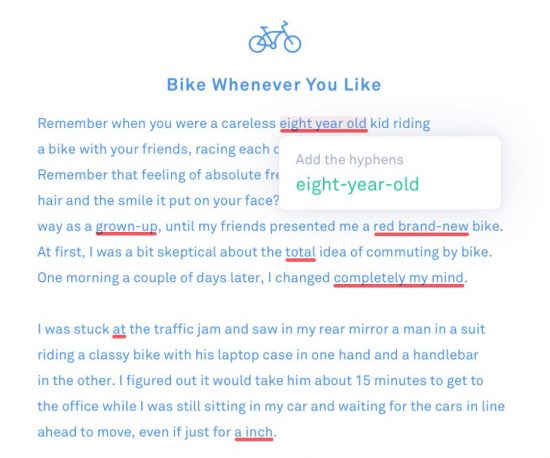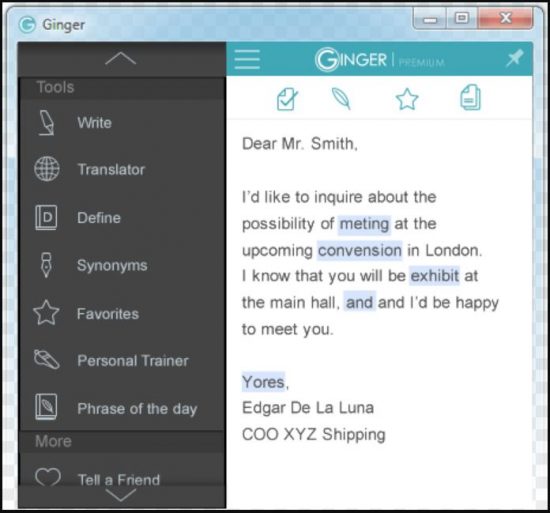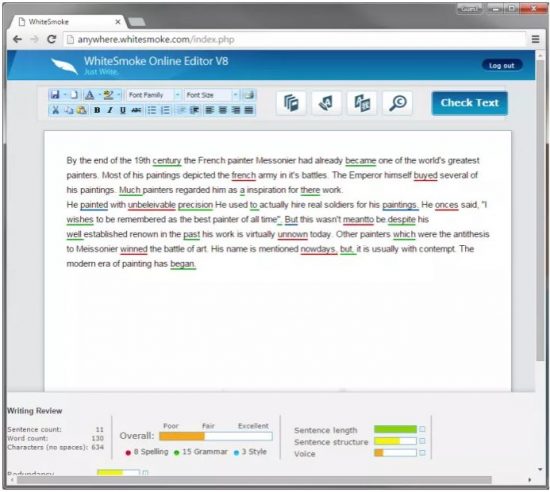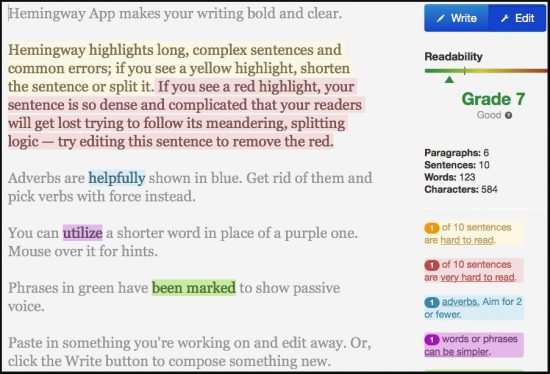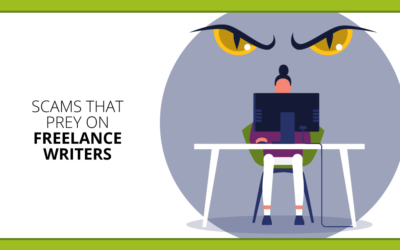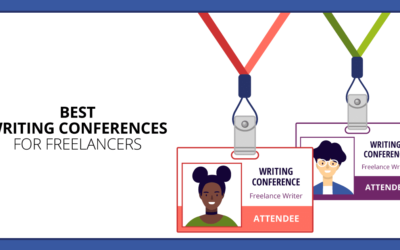
There’s the typical safeguards to catch spelling errors and basic grammar issues in programs like Microsoft Word and Google Docs.
But in the last few years, there’s been a kind of meeting of the minds between wordsmiths and software engineers to create more sophisticated grammar checker tools.
These grammar checker tools promise to:
- Catch spelling and grammar issues
- Fix punctuation problems
- Identify major issues in your writing
- Learn your writing style
- Offer specific recommendations based on the type of writing you’re doing (business, technical, medical, marketing, etc.)
Does that mean you can just spit out a rough draft and use a grammar checker tool to clean up your writing?
Let’s take a closer look at some popular grammar checker tools to find out if this is crucial software, or just a crutch for freelancers.
Grammar checker tools for freelance writers
In case you didn’t know, robots are already writing news stories that journalists once chased down with their own research and interviews.
So it’s not a big surprise that grammar checker tools are on the rise. (And if you’ve ever made a typo, you’ve probably been served by the grammar police.)
But can robots and software really catch your writing mistakes, learn all the nuances of the English language, and help you crank out better copy?
At one time, Microsoft practically owned the market on spelling and grammar tools. But now there are literally dozens of software programs, plug-ins, apps, and web-based grammar checker tools to choose from.
Here’s a look at four popular grammar checker tools and insights from freelancers who have used them.
Grammarly
Founded: 2009
Users: 4 million
Cost: Free to $29.99/month
If you haven’t heard of Grammarly, you must be exceptionally capable of ignoring ads. They’ve spent millions on getting the word out about their grammar checking/writing tool, with placements that include Gmail’s interface, Youtube, and other Google Display Network partners.
Grammarly’s free browser extension allows you to spell check writing in many formats:
- On social media
- In emails
- On Microsoft Word (via the Grammarly add-in, Windows only)
- On WordPress
And the paid version provides additional services to improve things like grammar, punctuation, word choice, and style choices in your writing.
Use it: Freelance Writer Amanda Cross says, “I run all of my blogs through Grammarly before I pass them over to my clients and it works fantastically.”
Lose it: “I’ve used the full paid version in the past, but found it cumbersome to sort through which of the recommendations were correct and which weren’t,” says freelance writer Kathy Krueger. “I think you need to know your grammar rules pretty well yourself to know when to override it.”
Ginger
Founded: 2007
Users: 5 million
Cost: Free to $14.98/month
Before Ginger joined the grammar checker line-up, the Israeli start-up created language processing and personal assistant software that Intel snatched up for an estimated $30 million in 2014. Ginger’s tool for writers is designed to work on traditional computers and mobile platforms, and provides the following services:
- Grammar checker
- Sentence rephrase
- Translation in 50 different languages
- Dictionary
- Text reader (used to hear what your copy sounds like out loud)
- Language trainer
Use it: “In a way, Ginger is a smarter spelling and grammar checker,” says freelance writer Alan Henry. “It likely won’t replace the writing tools you already use, but if you’re translating text and want it to make sense, or you’re double-checking your own writing for clarity, it can certainly help.”
Lose it: “A few drawbacks to Ginger include that it does not find errors in punctuation, sentence structure or numbers usage,” says freelance writer Aaron McCarter. “It doesn’t identify passive voice or plagiarism, and it doesn’t explain the reasons behind errors.”
White Smoke
Founded: 2002
Users: 50 million
Cost: Free to $119.95/year
WhiteSmoke got its start as a language training company 15 years ago aimed at helping people improve their English skills in speaking and writing. It started out as a tool mainly used for students, and evolved to appeal to freelance and professional writers.
WhiteSmoke works on your computer or any device (as long as you have an internet connection), and identifies grammar errors, punctuation mistakes, problems with sentence structure, and style.
Freelance writer Ali Luke put WhiteSmoke to the test and had mixed results when she used the software to draft a blog post. Luke says it did a good job spotting typos, but sometimes it flagged her work incorrectly, and a pop-up feature in the software was distracting.
Use it: “There were a few occasional slips when the software didn’t understand the meaning of what I’d written,” says Luke. “But so long as you don’t just accept every suggestion automatically, these infrequent mistakes shouldn’t cause too many problems.”
Lose it: “You might find WhiteSmoke frustrating if you use a lot of bullet points or other sentence fragments, or you’re already very confident about your spelling and grammar,” says Luke.
Hemingway Editor
Founded: 2013
Users: 4 million
Cost: Free to $19.99/month
Even though Hemingway Editor is a relatively new tool among grammar checkers, lots of writers appear to be testing out the software. Founders Adam and Ben Long said they’ve averaged 200,000 downloads a month in 2017, and writers are consistently asking for upgrades and new features.
This grammar checker gives your writing a reading grade level, similar to the Flesch-Kincaid score available in Microsoft Word. It flags words and sentences that are too long or complex, points out the overuse of adverbs, and highlights instances of passive voice for improvement.
Use it: “When I rewrite according to Hemingway’s suggested edits, the result is always stronger writing,” says writer and developer Natasha Postolovski. “Not every suggestion will match the tone or type of content you’re trying to write, but most will result in clearer sentences, and stronger ideas.”
Lose it: When writer Jerry Coyne put the Hemingway Editor to the test, he decided to gauge its ability to recognize great writing. It flagged some of Ernest Hemingway’s best work as bad writing. He tested his own writing, along with passages from other writers in the same league as Hemingway and the results were the same.
“My conclusion,” says Coyne. “This app is worthless. I dare not insert what I think is the most beautiful prose ever written in English: the last few paragraphs of James Joyce’s, The Dead.”
Should freelancers use grammar checker tools?
If you’re looking for a way to improve your writing and avoid making mistakes, grammar checker tools may be able to help you, says retired English professor Dr. John Thiesmeyer.
But in his own review of 50-plus grammar checkers, he found that Microsoft Word was just as effective or better at catching spelling, grammar, and style issues. (Translation: Don’t spend a lot of time or money on a grammar checker.)
It’s a sentiment a lot of professional freelance writers like Dan Kopf agree with.
“In the end, I don’t think [a grammar checker] app can turn you into a great writer,” says Kopf. “It will not make your work any funnier or more insightful. But it just might make you break up a run-on sentence or remove a useless word.”
“As Hemingway said, ‘The first draft of anything is shit.’ Anything that helps you get past that phase and onto the next is well worth it,” says Kopf.
What’s your take on grammar checkers for freelance writers? Let’s discuss on Facebook and LinkedIn.
Maddy Osman contributed to this post. When she’s not writing, she’s helping as an organizer of BMA Denver, Freelancers Union Denver, and WordCamp Denver.







